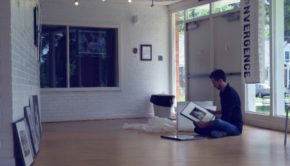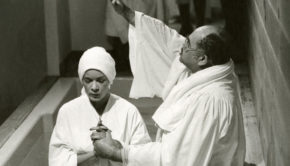
When Music Touches Your Soul
Last month, I attended a Lalah Hathaway concert, the first live concert I think I’ve attended in about a year. For those of you who don’t know, Lalah Hathaway is an R&B singer and daughter of the late Donny Hathaway. It was my first time hearing her perform and the audience’s response to her artistry sparked some thoughts in my mind about authenticity, soul, and participation in the black church.
It’s incredibly liberating to have the co-mingled sensation of being elevated by aesthetic delight, affirmed by words that reflect the life experiences of you and your loved ones, and honored by another’s desire to relate to you. This type of liberation is spiritual.
I should probably admit that my favorite genre of music is R&B/soul because of what its name suggests – the ability of the music to connect to the innermost parts of my being, the spirit inside of me that recognizes what is true. Whether they are speaking about joy or pain, love or loss, soul singers have a way of making me feel the authenticity of their souls conveyed through their music and lyrics. Because I agree with the feminist principle that the personal is political, I believe that feminists must take the time to recognize what is personally true for them and what is most real. This is so that feminists’ energies directed toward making the world a more just place can be sustained during times of struggle, and maintained with integrity, regardless of what sphere they’re located within. Soul music helps me remember who I am.
During the concert, I was lifted away from external concerns about money and school work and career pressures. I was enveloped by a warm voice, humor, style, and lyrical messages that spoke of true experiences common to many women. I was not surprised, then, that the bio on her website says this:
“Lalah understands who she is as an artist and continues to remain consistently true to her vision in song and lyric. Like aged, fine wine, her voice continues to get better with time. Throughout her career, Lalah has captivated audiences by channeling the essence of her father’s spirit in her music, while adding her signature flare. Her ability to touch a listener’s soul in one phrase is an extraordinary gift that is synonymous with the Hathaway brand.”
 Sharing the concert experience with one of my dearest friends, surrounded by other black women I did not know amplified my gratitude at being a witness to Lalah’s talent and the ease I felt in the setting. At times, the concert experience reminded me of the moments I have seen and felt the spirit of God within the black church. I identify as black and a regular church-goer, but I did not grow up in “the black church” itself; I’m only an occasional visitor, and it’s not a setting that typically evokes a sense of belonging within me. Yet it’s familiar enough that when elements of the black church experience show up in other contexts, I can recognize it.
Sharing the concert experience with one of my dearest friends, surrounded by other black women I did not know amplified my gratitude at being a witness to Lalah’s talent and the ease I felt in the setting. At times, the concert experience reminded me of the moments I have seen and felt the spirit of God within the black church. I identify as black and a regular church-goer, but I did not grow up in “the black church” itself; I’m only an occasional visitor, and it’s not a setting that typically evokes a sense of belonging within me. Yet it’s familiar enough that when elements of the black church experience show up in other contexts, I can recognize it.
When Lalah’s music touched the audience’s souls, many of the listeners would jump and shout and wave their hands and handkerchiefs in the air. She and the other musicians would talk to the audience, ask us questions, and we would answer back. They invited our participation and our response. I felt joy and lightness from the musicians’ attention to how engaged we were. I think it’s incredibly liberating to have the co-mingled sensation of being elevated by aesthetic delight, affirmed by words that reflect the life experiences of you and your loved ones, and honored by another’s desire to relate to you. This type of liberation is spiritual. It simultaneously brings you deeper within yourself and connects you to that which is beyond the individual to the communal and the divine.
I remain grateful that these types of liberating experiences occur for me in not only spaces set aside by religious institutions for devotional and worship practices, but in non-religious sites of beauty, artistry, shared humanity, and love.
Elise M. Edwards, PhD is a Lecturer in Christian Ethics at Baylor University and a recent graduate of Claremont Graduate University. She is also a registered architect in the State of Florida. Her interdisciplinary work examines issues of civic engagement and how beliefs and commitments are expressed publicly. As a black feminist, she primarily focuses on cultural expressions by, for, and about women and marginalized communities. Follow her blog.






